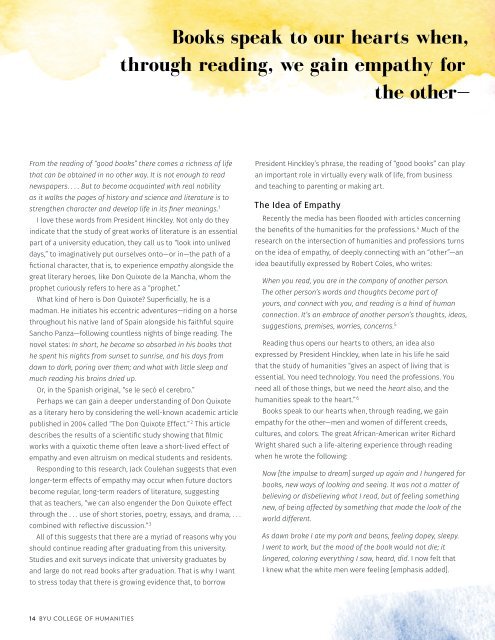Fall 2017
You also want an ePaper? Increase the reach of your titles
YUMPU automatically turns print PDFs into web optimized ePapers that Google loves.
Books speak to our hearts when,<br />
through reading, we gain empathy for<br />
the other—<br />
From the reading of “good books” there comes a richness of life<br />
that can be obtained in no other way. It is not enough to read<br />
newspapers. . . . But to become acquainted with real nobility<br />
as it walks the pages of history and science and literature is to<br />
strengthen character and develop life in its finer meanings. 1<br />
I love these words from President Hinckley. Not only do they<br />
indicate that the study of great works of literature is an essential<br />
part of a university education, they call us to “look into unlived<br />
days,” to imaginatively put ourselves onto—or in—the path of a<br />
fictional character, that is, to experience empathy alongside the<br />
great literary heroes, like Don Quixote de la Mancha, whom the<br />
prophet curiously refers to here as a “prophet.”<br />
What kind of hero is Don Quixote? Superficially, he is a<br />
madman. He initiates his eccentric adventures—riding on a horse<br />
throughout his native land of Spain alongside his faithful squire<br />
Sancho Panza—following countless nights of binge reading. The<br />
novel states: In short, he became so absorbed in his books that<br />
he spent his nights from sunset to sunrise, and his days from<br />
dawn to dark, poring over them; and what with little sleep and<br />
much reading his brains dried up.<br />
Or, in the Spanish original, “se le secó el cerebro.”<br />
Perhaps we can gain a deeper understanding of Don Quixote<br />
as a literary hero by considering the well-known academic article<br />
published in 2004 called “The Don Quixote Effect.” 2 This article<br />
describes the results of a scientific study showing that filmic<br />
works with a quixotic theme often leave a short-lived effect of<br />
empathy and even altruism on medical students and residents.<br />
Responding to this research, Jack Coulehan suggests that even<br />
longer-term effects of empathy may occur when future doctors<br />
become regular, long-term readers of literature, suggesting<br />
that as teachers, “we can also engender the Don Quixote effect<br />
through the . . . use of short stories, poetry, essays, and drama, . . .<br />
combined with reflective discussion.” 3<br />
All of this suggests that there are a myriad of reasons why you<br />
should continue reading after graduating from this university.<br />
Studies and exit surveys indicate that university graduates by<br />
and large do not read books after graduation. That is why I want<br />
to stress today that there is growing evidence that, to borrow<br />
President Hinckley’s phrase, the reading of “good books” can play<br />
an important role in virtually every walk of life, from business<br />
and teaching to parenting or making art.<br />
The Idea of Empathy<br />
Recently the media has been flooded with articles concerning<br />
the benefits of the humanities for the professions. 4 Much of the<br />
research on the intersection of humanities and professions turns<br />
on the idea of empathy, of deeply connecting with an “other”—an<br />
idea beautifully expressed by Robert Coles, who writes:<br />
When you read, you are in the company of another person.<br />
The other person’s words and thoughts become part of<br />
yours, and connect with you, and reading is a kind of human<br />
connection. It’s an embrace of another person’s thoughts, ideas,<br />
suggestions, premises, worries, concerns. 5<br />
Reading thus opens our hearts to others, an idea also<br />
expressed by President Hinckley, when late in his life he said<br />
that the study of humanities “gives an aspect of living that is<br />
essential. You need technology. You need the professions. You<br />
need all of those things, but we need the heart also, and the<br />
humanities speak to the heart.” 6<br />
Books speak to our hearts when, through reading, we gain<br />
empathy for the other—men and women of different creeds,<br />
cultures, and colors. The great African-American writer Richard<br />
Wright shared such a life-altering experience through reading<br />
when he wrote the following:<br />
Now [the impulse to dream] surged up again and I hungered for<br />
books, new ways of looking and seeing. It was not a matter of<br />
believing or disbelieving what I read, but of feeling something<br />
new, of being affected by something that made the look of the<br />
world different.<br />
As dawn broke I ate my pork and beans, feeling dopey, sleepy.<br />
I went to work, but the mood of the book would not die; it<br />
lingered, coloring everything I saw, heard, did. I now felt that<br />
I knew what the white men were feeling [emphasis added].<br />
14 BYU COLLEGE OF HUMANITIES


